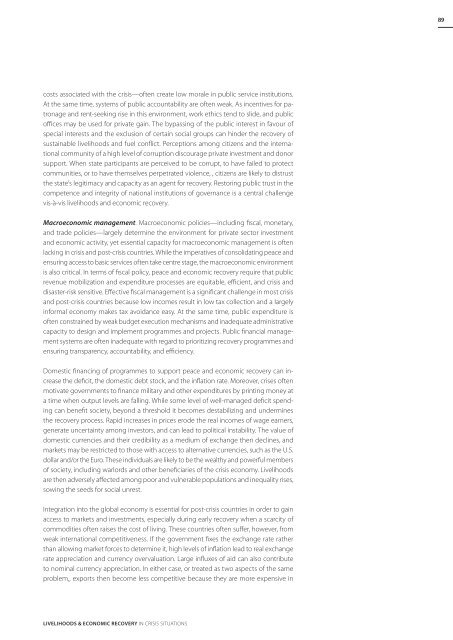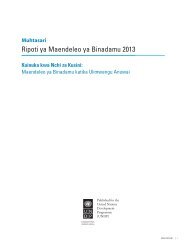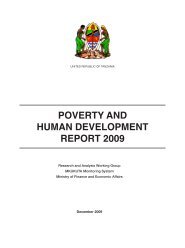Download PDF (4.08 MB) - ReliefWeb
Download PDF (4.08 MB) - ReliefWeb
Download PDF (4.08 MB) - ReliefWeb
You also want an ePaper? Increase the reach of your titles
YUMPU automatically turns print PDFs into web optimized ePapers that Google loves.
89<br />
costs associated with the crisis—often create low morale in public service institutions.<br />
At the same time, systems of public accountability are often weak. As incentives for patronage<br />
and rent-seeking rise in this environment, work ethics tend to slide, and public<br />
offices may be used for private gain. The bypassing of the public interest in favour of<br />
special interests and the exclusion of certain social groups can hinder the recovery of<br />
sustainable livelihoods and fuel conflict. Perceptions among citizens and the international<br />
community of a high level of corruption discourage private investment and donor<br />
support. When state participants are perceived to be corrupt, to have failed to protect<br />
communities, or to have themselves perpetrated violence, , citizens are likely to distrust<br />
the state’s legitimacy and capacity as an agent for recovery. Restoring public trust in the<br />
competence and integrity of national institutions of governance is a central challenge<br />
vis-à-vis livelihoods and economic recovery.<br />
Macroeconomic management. Macroeconomic policies—including fiscal, monetary,<br />
and trade policies—largely determine the environment for private sector investment<br />
and economic activity, yet essential capacity for macroeconomic management is often<br />
lacking in crisis and post-crisis countries. While the imperatives of consolidating peace and<br />
ensuring access to basic services often take centre stage, the macroeconomic environment<br />
is also critical. In terms of fiscal policy, peace and economic recovery require that public<br />
revenue mobilization and expenditure processes are equitable, efficient, and crisis and<br />
disaster-risk sensitive. Effective fiscal management is a significant challenge in most crisis<br />
and post-crisis countries because low incomes result in low tax collection and a largely<br />
informal economy makes tax avoidance easy. At the same time, public expenditure is<br />
often constrained by weak budget execution mechanisms and inadequate administrative<br />
capacity to design and implement programmes and projects. Public financial management<br />
systems are often inadequate with regard to prioritizing recovery programmes and<br />
ensuring transparency, accountability, and efficiency.<br />
Domestic financing of programmes to support peace and economic recovery can increase<br />
the deficit, the domestic debt stock, and the inflation rate. Moreover, crises often<br />
motivate governments to finance military and other expenditures by printing money at<br />
a time when output levels are falling. While some level of well-managed deficit spending<br />
can benefit society, beyond a threshold it becomes destabilizing and undermines<br />
the recovery process. Rapid increases in prices erode the real incomes of wage earners,<br />
generate uncertainty among investors, and can lead to political instability. The value of<br />
domestic currencies and their credibility as a medium of exchange then declines, and<br />
markets may be restricted to those with access to alternative currencies, such as the U.S.<br />
dollar and/or the Euro. These individuals are likely to be the wealthy and powerful members<br />
of society, including warlords and other beneficiaries of the crisis economy. Livelihoods<br />
are then adversely affected among poor and vulnerable populations and inequality rises,<br />
sowing the seeds for social unrest.<br />
Integration into the global economy is essential for post-crisis countries in order to gain<br />
access to markets and investments, especially during early recovery when a scarcity of<br />
commodities often raises the cost of living. These countries often suffer, however, from<br />
weak international competitiveness. If the government fixes the exchange rate rather<br />
than allowing market forces to determine it, high levels of inflation lead to real exchange<br />
rate appreciation and currency overvaluation. Large influxes of aid can also contribute<br />
to nominal currency appreciation. In either case, or treated as two aspects of the same<br />
problem,, exports then become less competitive because they are more expensive in<br />
Livelihoods & Economic Recovery in Crisis Situations





